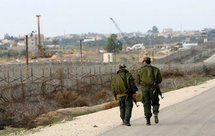
Another witness said metal sheets were also being inserted in Dihniya, a town further south.
Reports that Egypt is building an underground wall are "mainly true," an official stationed near the border with the Gaza Strip told AFP on condition of anonymity.
Smugglers say the wall will not deter their efforts to supply the Gaza Strip which has relied on tunnels since Israel closed the enclave after Hamas seized control from loyalists of Palestinian president Mahmud Abbas.
One smuggler told AFP that a metal sheet placed into the ground had cut into a tunnel, but that smugglers had managed to make a hole through it.
"There will never be problems building tunnels, the smugglers can just keep going lower than the metal sheets," another source close to smugglers said.
Egypt has not officially responded to the reports. The interior ministry on Thursday referred AFP to the foreign ministry, which had no comment.
Haaretz reported that Egypt was constructing a massive underground iron wall along the entire nine-to-10 kilometre (six-mile) length of the border.
The daily cited Egyptian sources as saying that the barrier would extend 20 to 30 metres underground in a bid to block all but the most determined of smugglers.
"It will be impossible to cut or melt," the paper said, although it added: "It is not expected to stem smuggling completely."
Over the past few days, witnesses and residents reported intense activity around the border area, with pipes being placed underground.
Israel has closed off Gaza, a crowded enclave of 1.5 million people, to all but very limited basic supplies since Hamas seized control of the territory in June 2007.
The territory has since been dependent on smuggling for all but those supplies and the border is honeycombed with tunnels, which often collapse, sometimes claiming the lives of smugglers.
Israel has long complained about the tunnels, which are also used to bring in weapons. It conditioned ending a war in December and January with Hamas on guarantees for an end to the smuggling.
During the war, Egypt faced acerbic criticism from several countries in the region for refusing to permanently open its Rafah border crossing, although it allowed in a stream of medical supplies and treated wounded Palestinians.
A wall would throttle Gaza even further, as the border crossings are not likely to be reopened as long as Hamas and Israel remain at daggers-drawn.
It could also be seen as a subterranean equivalent of Israel's meandering security barrier that boxes in large portions of the West Bank, a project Egypt vehemently opposed.
Unnamed security officials told an Egyptian independent daily on Thursday there were no plans to build a wall and that engineers were placing surveillance equipment along the border.
-------------------------------------------------------------------------------------------------------------------------------
Reports that Egypt is building an underground wall are "mainly true," an official stationed near the border with the Gaza Strip told AFP on condition of anonymity.
Smugglers say the wall will not deter their efforts to supply the Gaza Strip which has relied on tunnels since Israel closed the enclave after Hamas seized control from loyalists of Palestinian president Mahmud Abbas.
One smuggler told AFP that a metal sheet placed into the ground had cut into a tunnel, but that smugglers had managed to make a hole through it.
"There will never be problems building tunnels, the smugglers can just keep going lower than the metal sheets," another source close to smugglers said.
Egypt has not officially responded to the reports. The interior ministry on Thursday referred AFP to the foreign ministry, which had no comment.
Haaretz reported that Egypt was constructing a massive underground iron wall along the entire nine-to-10 kilometre (six-mile) length of the border.
The daily cited Egyptian sources as saying that the barrier would extend 20 to 30 metres underground in a bid to block all but the most determined of smugglers.
"It will be impossible to cut or melt," the paper said, although it added: "It is not expected to stem smuggling completely."
Over the past few days, witnesses and residents reported intense activity around the border area, with pipes being placed underground.
Israel has closed off Gaza, a crowded enclave of 1.5 million people, to all but very limited basic supplies since Hamas seized control of the territory in June 2007.
The territory has since been dependent on smuggling for all but those supplies and the border is honeycombed with tunnels, which often collapse, sometimes claiming the lives of smugglers.
Israel has long complained about the tunnels, which are also used to bring in weapons. It conditioned ending a war in December and January with Hamas on guarantees for an end to the smuggling.
During the war, Egypt faced acerbic criticism from several countries in the region for refusing to permanently open its Rafah border crossing, although it allowed in a stream of medical supplies and treated wounded Palestinians.
A wall would throttle Gaza even further, as the border crossings are not likely to be reopened as long as Hamas and Israel remain at daggers-drawn.
It could also be seen as a subterranean equivalent of Israel's meandering security barrier that boxes in large portions of the West Bank, a project Egypt vehemently opposed.
Unnamed security officials told an Egyptian independent daily on Thursday there were no plans to build a wall and that engineers were placing surveillance equipment along the border.
-------------------------------------------------------------------------------------------------------------------------------









 Home
Home Politics
Politics









